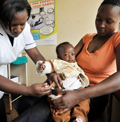 Vaccines against the primary cause of deaths from pneumonia in developing countries could save millions of lives and are highly cost-effective, according to a comprehensive new analysis to be released to mark World Pneumonia Day.
Vaccines against the primary cause of deaths from pneumonia in developing countries could save millions of lives and are highly cost-effective, according to a comprehensive new analysis to be released to mark World Pneumonia Day.
In a paper published in the journal International Health, the authors estimate that two pneumococcal vaccines being introduced in the world’s poorest countries with support from the GAVI Alliance – a public-private health partnerships – could save the lives of three to four million children over the next 10 years.
A separate report released by the International Vaccine Access Center (IVAC) at the Johns Hopkins University shows that progress in rolling out interventions to control pneumonia has been uneven, with the greatest recent progress in access to vaccines but lingering lack of access to medical care and antibiotics in the countries where children are most vulnerable to pneumonia.
Pneumonia took the lives of more than 1.5 million children in 2008 – more than any other cause of death, and over 98% of those deaths are in developing countries. However, there is emerging evidence that this death toll can be reduced, and rapidly.
With GAVI’s support, some of the world’s poorest countries are signing up at an unprecedented rate to introduce vaccines against pneumococcal disease, a leading cause of pneumonia and meningitis.
Read: Breakthrough on cheaper vaccines for developing countries
According to the Pneumococcal Global Serotype Project, the new vaccines are expected to prevent more than 70% of serious pneumococcal infections among children in Africa and Asia, where children have the highest risk of this disease.
“In 2011, 3.6 million children will be immunised against pneumococcal disease, and 10 million more are expected to receive the vaccine by the end of next year,” said Dr Seth Berkley, CEO of the GAVI Alliance.
On World Pneumonia Day, 12th of November, Malawi became the 16th of the world’s lowest-income countries to introduces the pneumococcal vaccine for its children. GAVI plans to roll out the vaccine to nearly 60 countries by 2015.
Despite recent progress in vaccine access, however, children often do not receive appropriate antibiotic treatment for pneumonia cases that do occur. The IVAC report shows that while progress is being made with vaccination in the 15 countries with the most child pneumonia deaths, the latest data show that all of these countries have sub-optimal levels of protection and treatment interventions, including exclusive breastfeeding, access to care facilities and treatment with antibiotics.
“Vaccines and antibiotic treatments are like two safety nets that work together – vaccines provide a first line of defense, while antibiotics ensure that children who get through the first net don’t die,” said Orin Levine, professor and executive director of IVAC.
New research, funded by GAVI and conducted by an independent group of academic researchers, finds that the benefits of vaccination go far beyond the children who are actually immunised.
The authors estimate that “herd immunity” would protect older adults and younger children, because they will be exposed to fewer sources of infection. They also note that the vaccines being introduced with GAVI’s support will cover more strains of pneumonia, are cost-effective and save more lives.
World Pneumonia Day saw a major global push to increase awareness of pneumonia. GAVI organised a ‘Blog Carnival’ to encourage bloggers to mention the impact of the disease, and the #WPD2011 hashtag was used to discuss the issue on Twitter.
Read: ‘Take every opportunity to vaccinate your child’
Watch: Pneumococcal disease – a preventable killer



